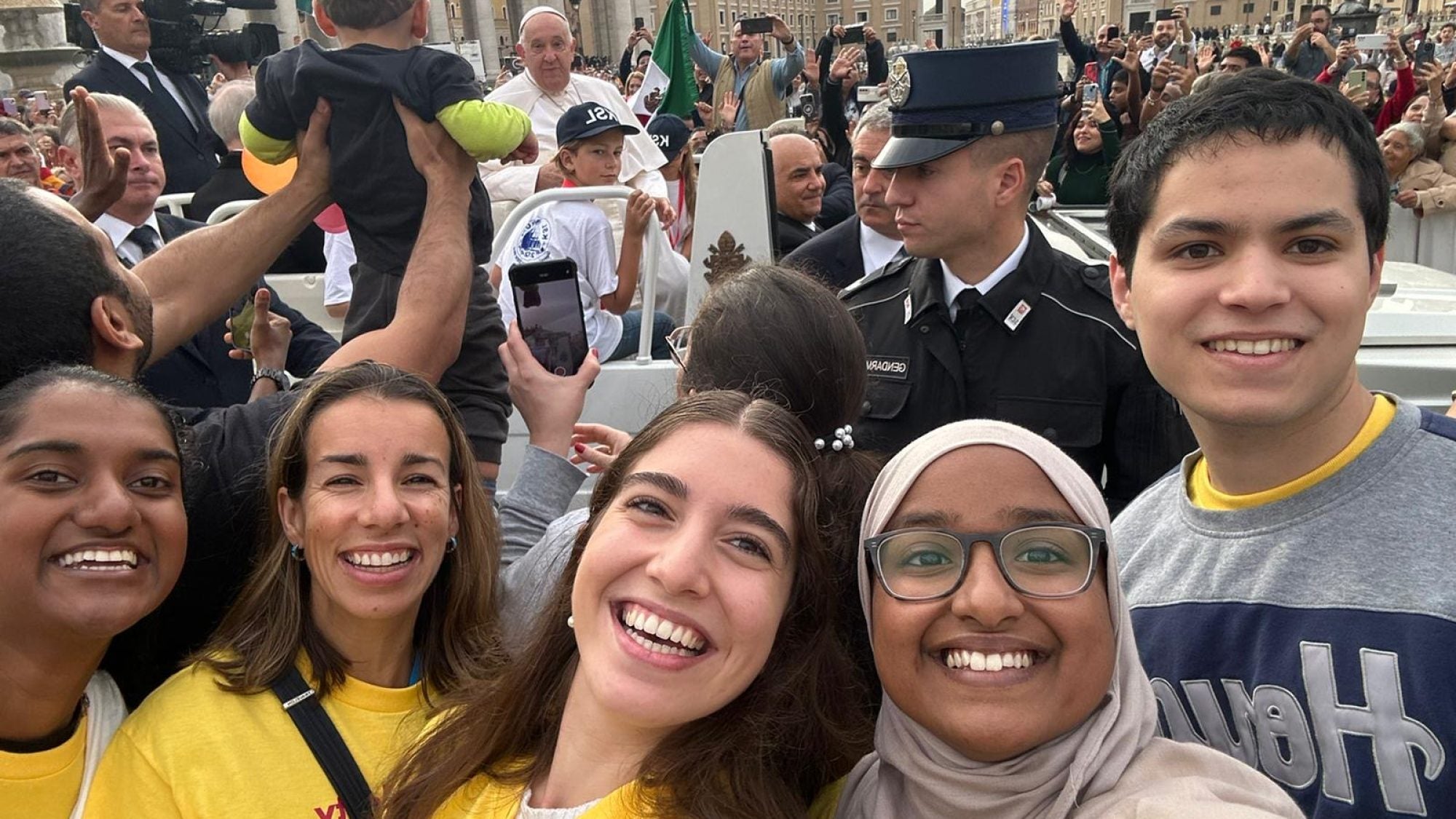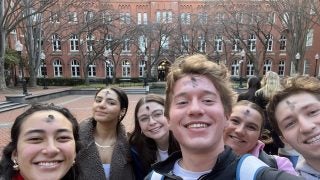Alejandra Cova (H’26) is a junior in the School of Health studying global health with minors in economics and science, technology, and international affairs. She is originally from Venezuela and is an active member of the Hispanic Catholic Ministry at Georgetown.
As I embarked on my first pilgrimage, Rome welcomed me not just as a tourist but as a witness to history changing. In October, I had the privilege to travel to Rome during the third week of the month-long meeting of the General Assembly of the Synod of Bishops. Along with four other Georgetown students, Dean Vanessa Corcoran and Dr. Annie Selak from the Women’s Center, we formed part of a larger group called CENTERS (Catholic Education Network to Encounter Rome and Synodality) which comprised of over 150 students, campus ministers and educators from 15 other Catholic U.S. colleges and universities. It was amazing to meet so many young people who are interested and invested in the Church’s future, especially as this synod on synodality comes to its conclusion in its third year.
For those who are wondering what “synodality” means, I have to admit that my own definition and understanding of it constantly changed as the days progressed in Rome. Pope Francis has used this synod to gently open the Church toward reforms. This three-year synod is rooted in continuing conversations from Vatican II about the global Church’s role in implementing structural reforms to achieve a truly equal and representative Church of and for its followers.
The synod stresses listening and participation of lay people (especially women), reimagines the role of bishops, and rethinks the Church’s decision-making processes. In short, synodality attempts to dismantle the Church’s top-down structure by giving voice to those at all levels of the Church. While past synods have only allowed bishops and some non-ordained men to vote, this synod is the first to include women as delegates and voting members, as well as 20 theologians and young lay people.
This year’s synod also places a special emphasis on what Pope Francis calls a “preferential option for young people,” a recognition that the youth are a key agent of synodality whose voices should be heard. This is where we came in.
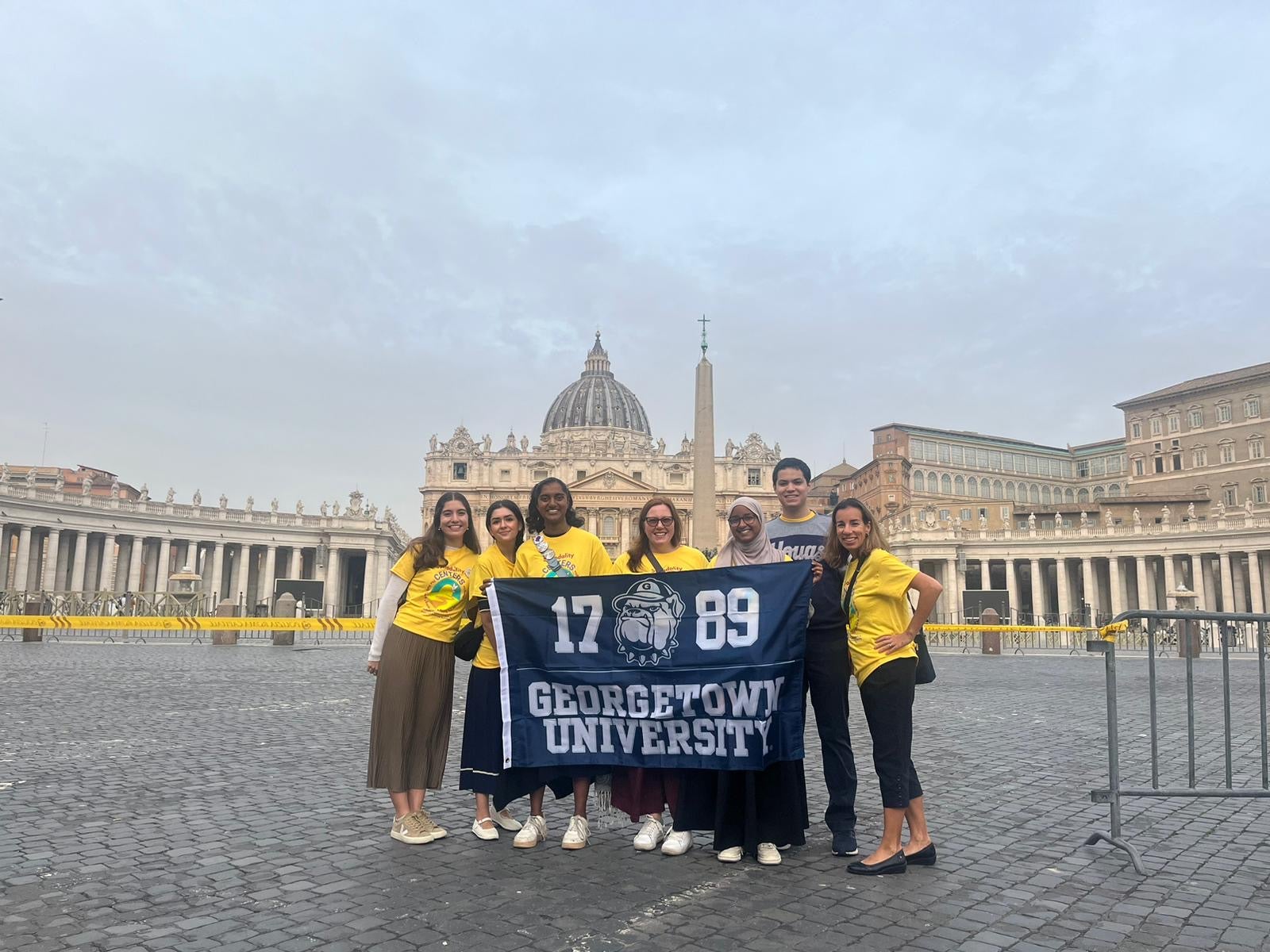
With a private invitation on Friday into the Paul VI audience hall to ask questions of synod delegates, we spent the week preparing through “synodal teach-ins” at Lasallian Generalate. We attempted to mirror the synod’s structure of “conversations in the spirit” by breaking off into smaller groups to discuss issues that the synod has outlined in their own discussion schedule.
For example, the role of women and the diaconate, migration, LBGTQ inclusion, climate justice, racial justice, interfaith engagement, and peacebuilding were among some of our discussion themes. In my discussion group focused on climate justice, each person shared their own perceptions about how the Church can better address environmental justice. We brainstormed questions to ask synod delegates at our private audience, such as how the Church can change formal catechesis to include climate justice.
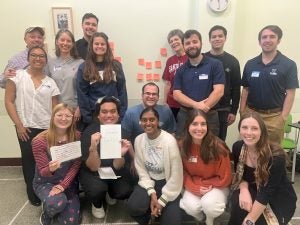
Throughout the week, we also had amazing opportunities to engage with Vatican bishops and synod delegates outside of their synod gatherings. We also participated in a Q&A discussion with the Vatican’s Dicastery of Interreligious Dialogue, which Annie Selak helped organize.
I am grateful to have had the opportunity to have dinner with Bishop Daniel Flores from Brownsville, Texas, where I learned about how his diocese is addressing migration and gang violence. Something that resonated with me was how Bishop Flores defined synodality as “allowing yourself to be moved by the person across the road that you thought had nothing in common with you”.
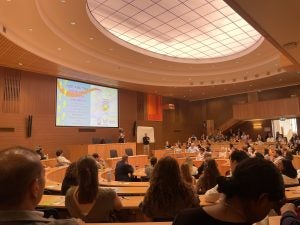
We had two events in the Jesuit Curia and at the International Union of Superiors General where we met other synod delegates, such as Sr. Nathalie Becquart, who is the synod undersecretary and the first woman to vote in any synod.
We met Fr. Jim Martin, S.J., and Fr. Mark Ravizza, S.J., who is a Jesuit priest living and serving at the Jesuit Curia. Fr. Ravizza generously gave us a tour of the curia and joined us for dinner, which turned out to be one of the most meaningful conversations and encounters of the week. He shared with us his own perspective on synodality, expressing how he believes that “the Holy Spirit talks to everyone at different levels in the Church in a unique way.”
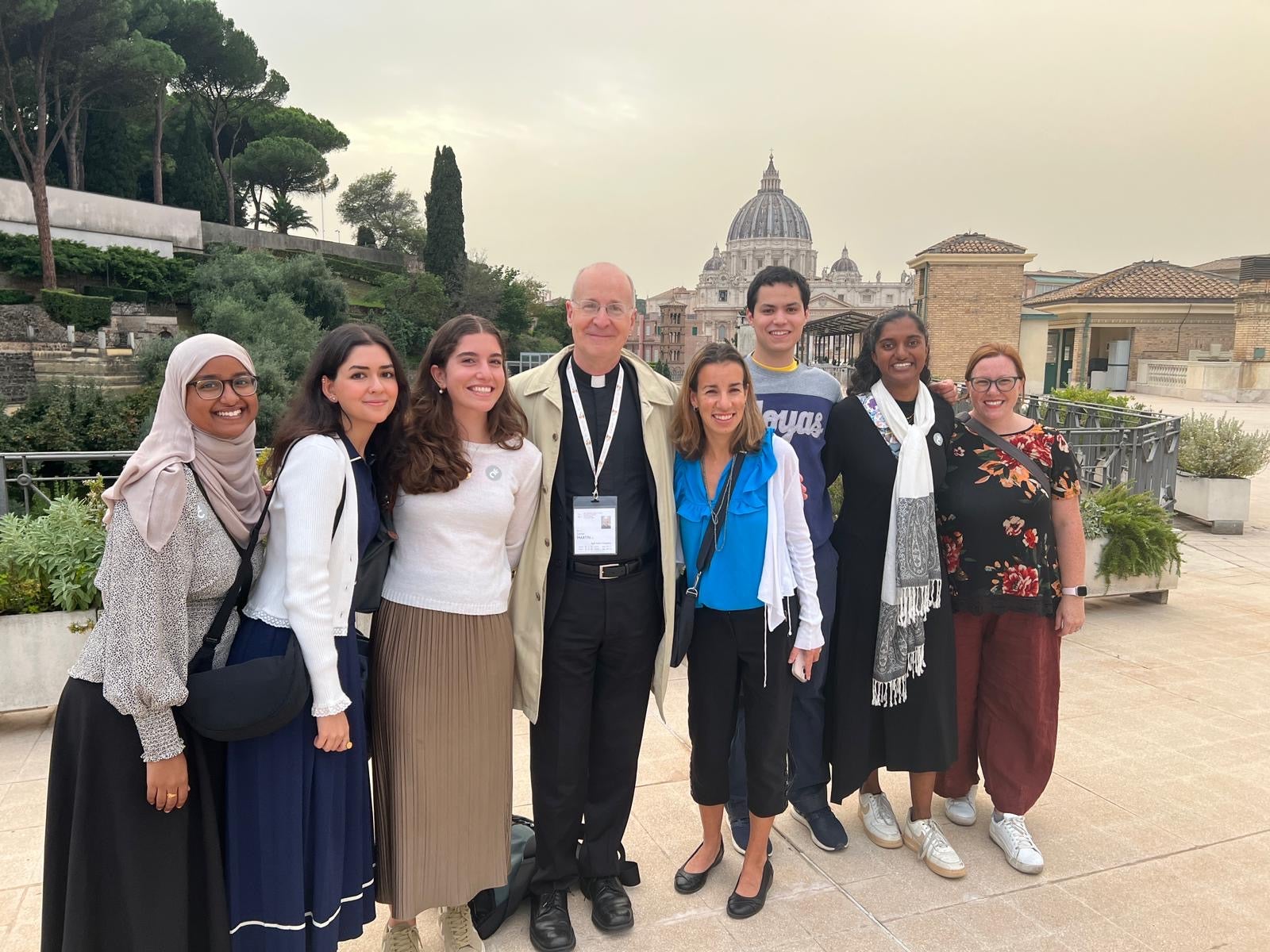
Above all, it was inspiring to attend Pope Francis’ weekly General Audience. The excitement was high as he passed through the crowd waving and blessing babies. It was particularly special to me to hear how smoothly the ceremony transitioned from speeches in English to Italian to Spanish to German and to Arabic, reminding me of the truly global Church that I am a part of. The short ceremony was dedicated to peace and addressed differences between Christian denominations and other faiths. I remember Pope Francis saying, “Queste differenze sono riconciliati” (these differences are reconciled) and “Ricordiamo che la guerra è sempre, sempre una sconfitta” (Let us remember that war is always, always a defeat). At the end, he blessed us and reminded us to never forget to thank God.
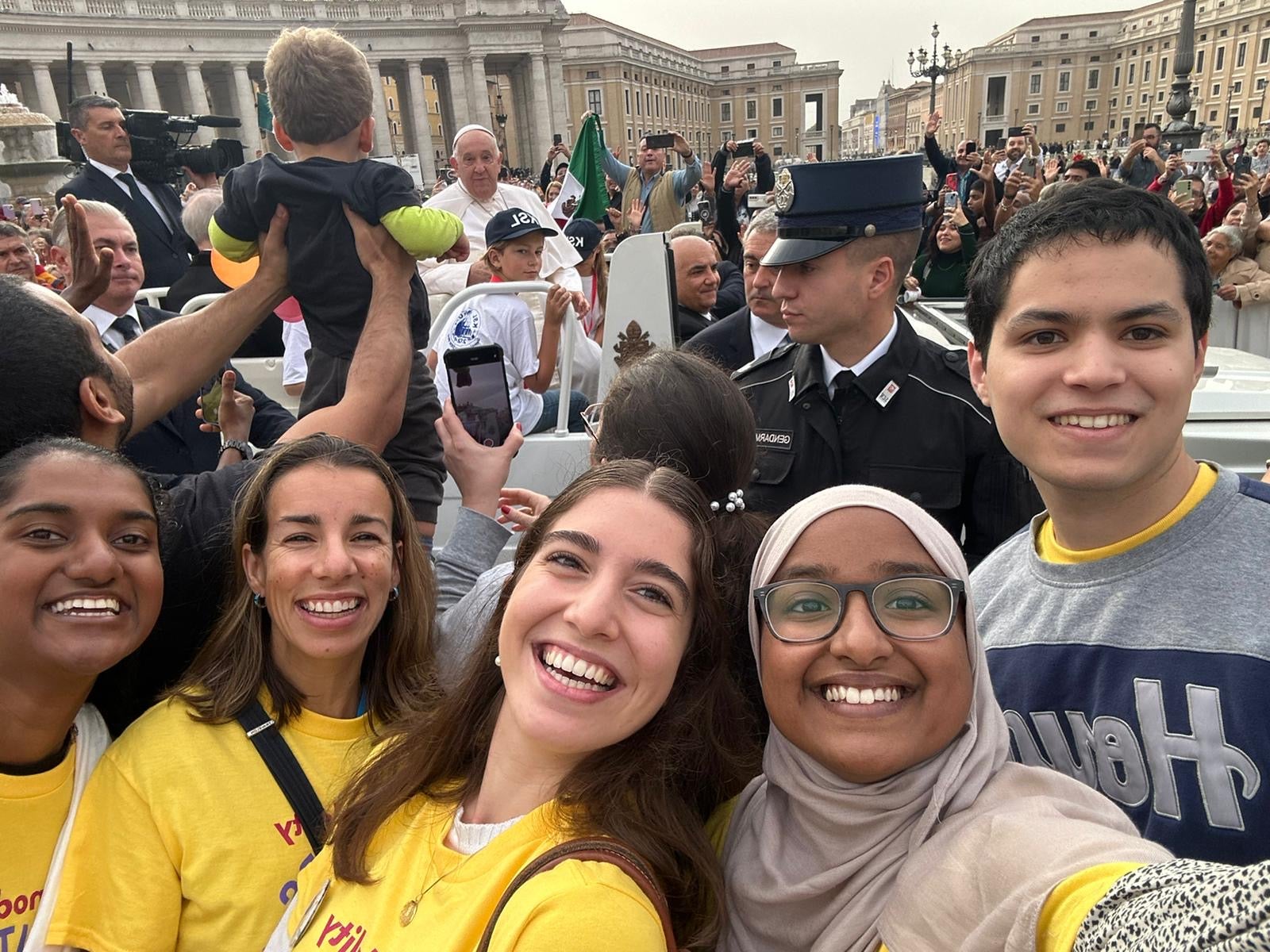
Perhaps most importantly, at the end of the week, we – as CENTERS – were invited to a private encounter with Synod delegates at the Paul VI Synod Hall in the Vatican. Every university chose one student to ask a question to the delegates in what would become the Vatican’s first event of live streaming an encounter with university students inside their walls. I represented Georgetown’s cohort and asked why young people who are not engaged in the Church should care about synodality, and how to address people who have been hurt by the Church.
To speak directly to all those delegates in the Vatican was an experience that I definitely did not predict in my 2024 bingo card. I never imagined that I would be able to ask this question about pain, about exclusion, which was so close to my heart, to leaders with such high power to rectify this for others who feel the same way. Especially as I have dealt with my own experiences of ostracization by the Church, I was relieved to be met with such openness and genuine sympathy to hearing my concerns.
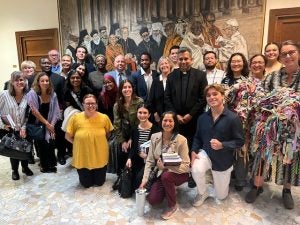
If I have learned anything through this experience, it is to not ignore or disregard the difficult questions. Our Georgetown group went through a lot of introspection and discussions about how people of other faiths fit into the decisions of the synod. What if people who come from multifaith backgrounds don’t feel supported by the Church? How do the decisions of the Church impact those who are not Catholic?
As a Venezuelan Catholic who grew up in the Middle East, I am constantly reminded that people’s lived experiences and reasons for being faithful can be so complex and diverse. That I had the honor to meet Muslim, Hindu and Greek Orthodox Christian students in Rome this week – all with the same passion to discuss how the Catholic Church can better serve its mission – supports such an outlook. Although at times I felt like our difficult questions were left unanswered, I hope that they sparked some desire in synod delegates to tangibly promote actions that will include these non-Catholics at the margins into our global Church.
